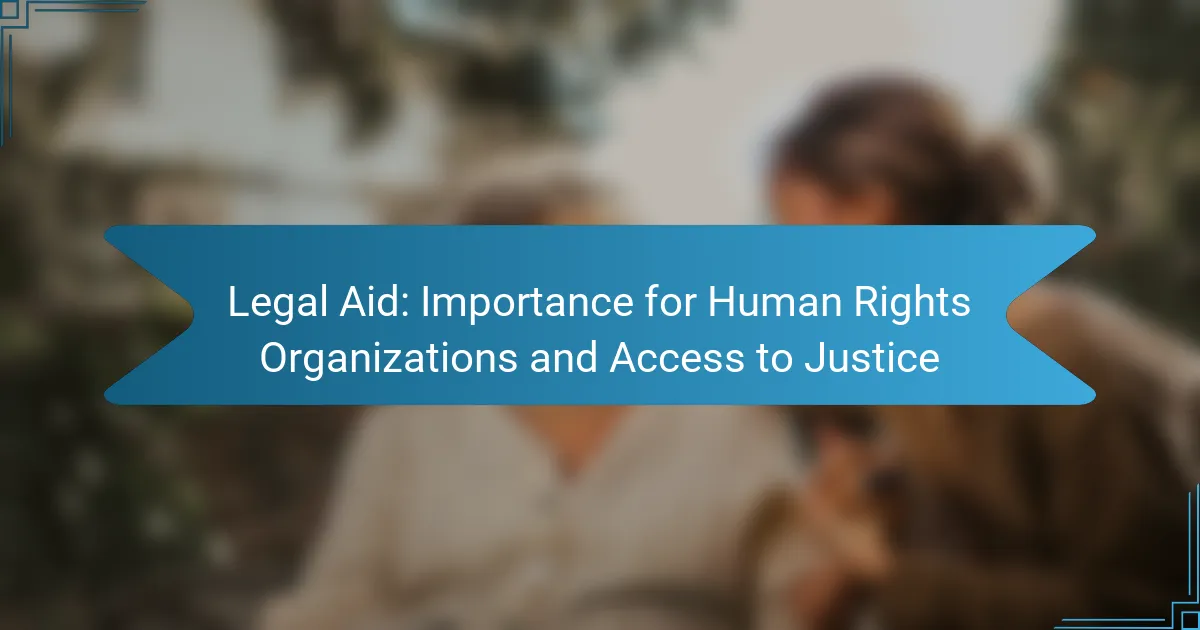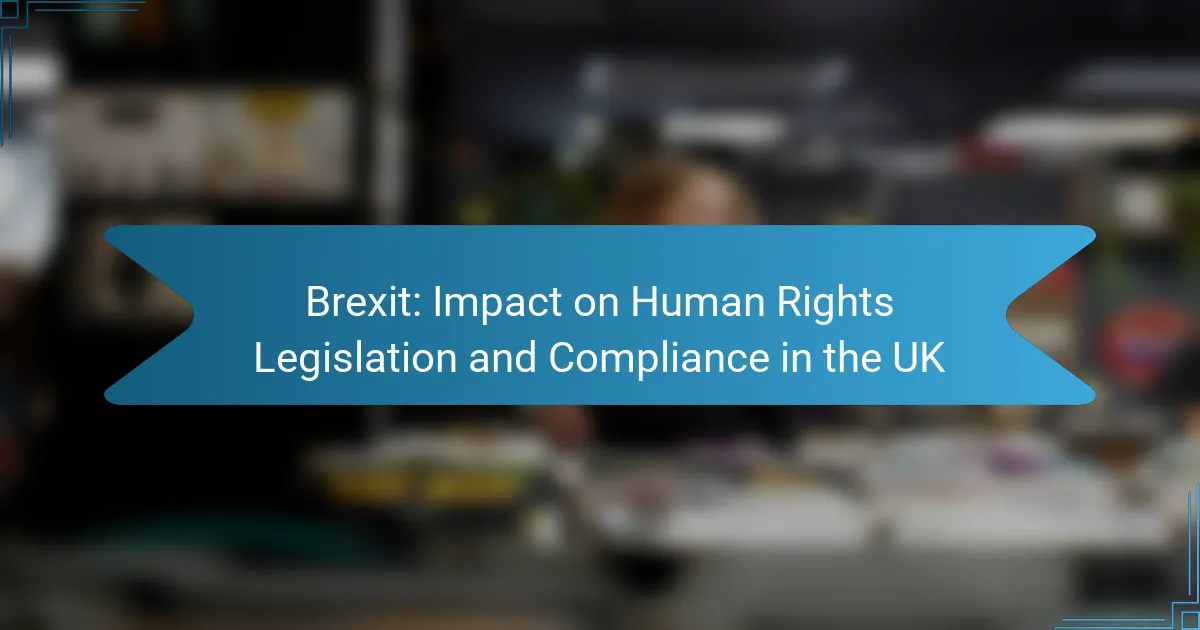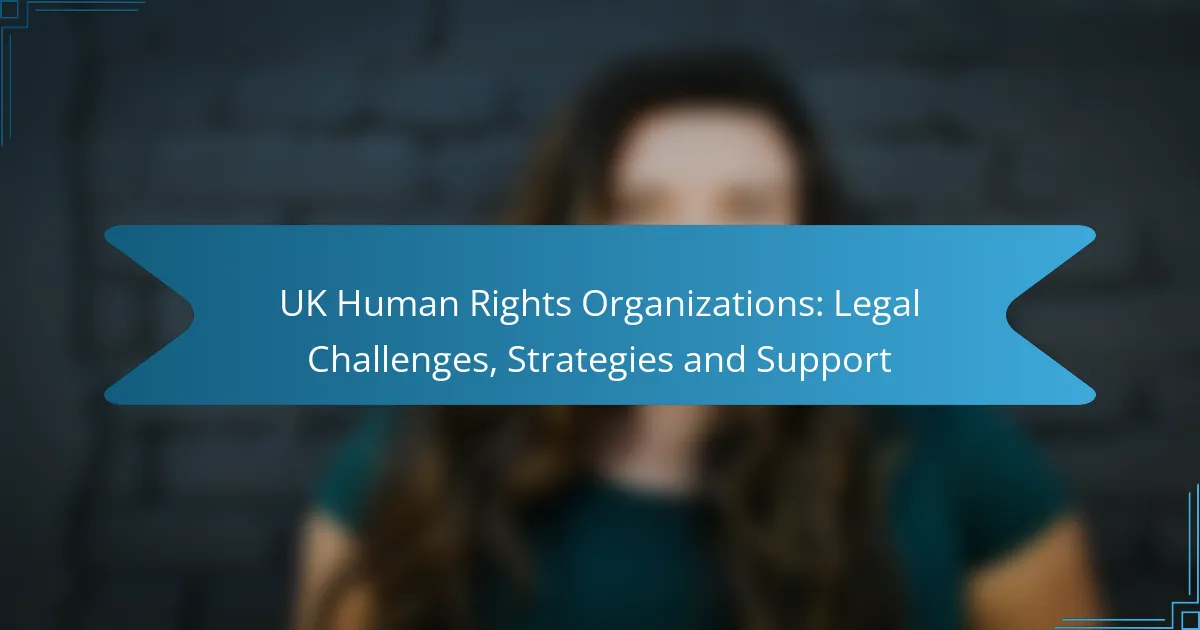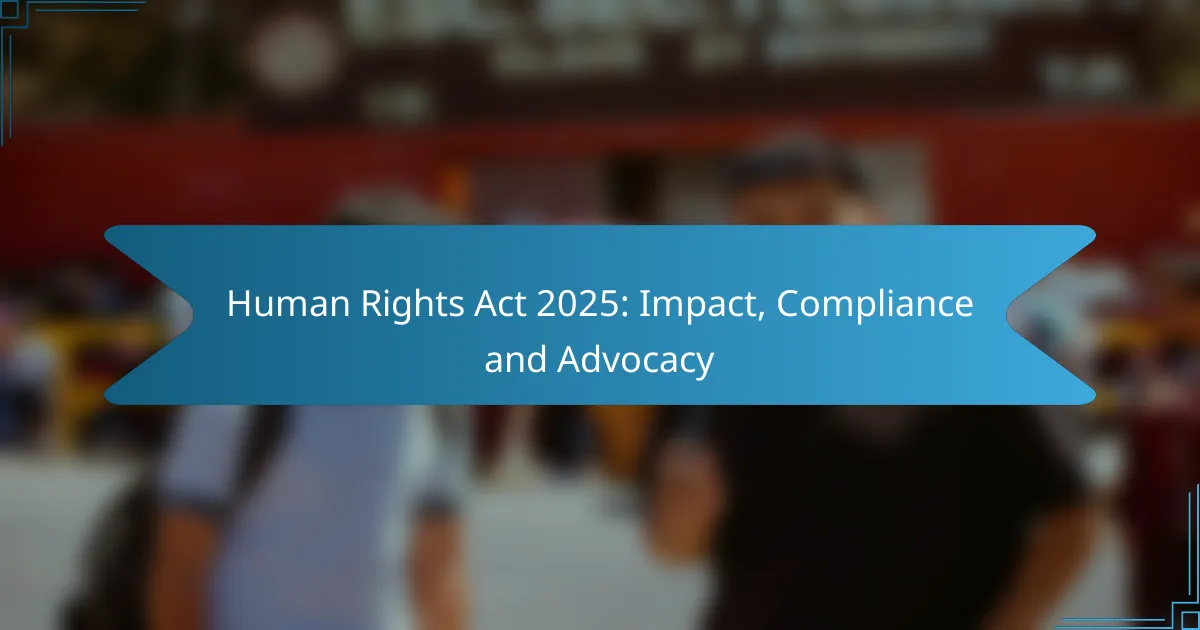Legal aid plays a vital role in supporting human rights organizations by facilitating access to justice for individuals who cannot afford legal representation. It empowers these organizations to effectively advocate for the rights of marginalized communities, ensuring that everyone has the opportunity to navigate the legal system and assert their rights, regardless of their financial situation.
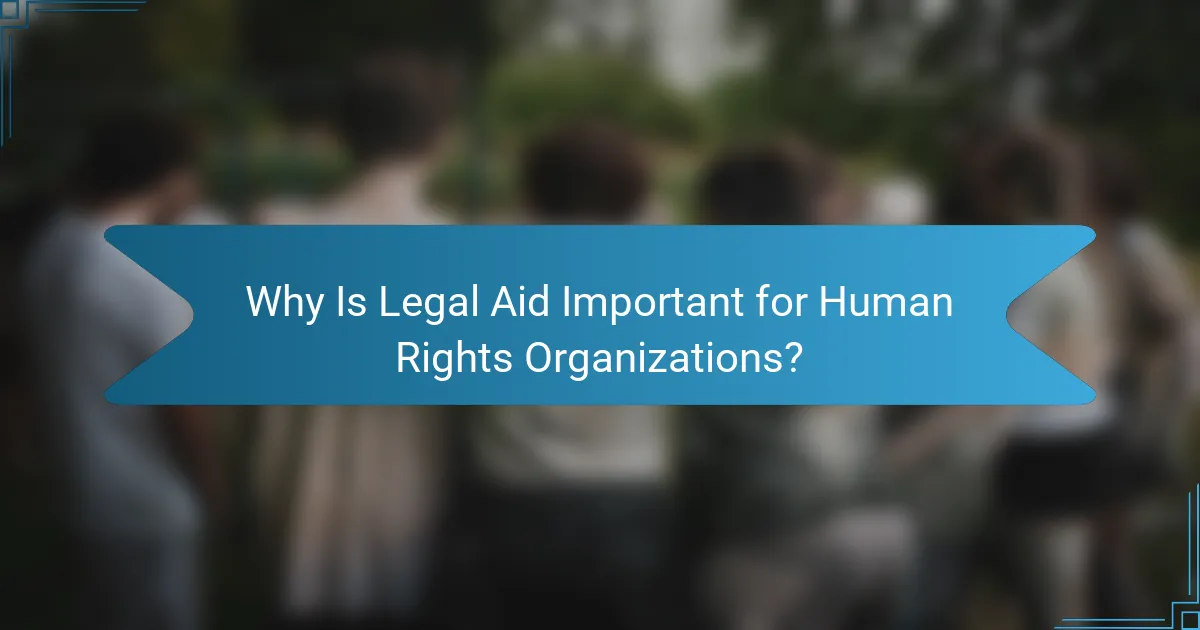
Why Is Legal Aid Important for Human Rights Organizations?
Legal aid is crucial for human rights organizations as it ensures that individuals can access justice, particularly those who cannot afford legal representation. By providing support and resources, legal aid empowers these organizations to advocate effectively for the rights of marginalized communities.
Facilitates access to justice
Legal aid facilitates access to justice by removing financial barriers that often prevent individuals from seeking legal assistance. Organizations can offer free or low-cost legal services, ensuring that everyone, regardless of income, can pursue their rights in court.
This access is particularly vital in cases involving discrimination, abuse, or violations of fundamental rights, where timely legal intervention can significantly impact outcomes.
Supports vulnerable populations
Legal aid plays a key role in supporting vulnerable populations, including refugees, women, and low-income families. These groups often face complex legal challenges that require specialized knowledge and resources.
By providing targeted legal assistance, human rights organizations can help these populations navigate the legal system, ensuring their voices are heard and their rights are protected.
Enhances legal representation
Legal aid enhances legal representation by ensuring that individuals have access to qualified attorneys who can advocate on their behalf. This professional support is essential in cases where legal complexities may overwhelm those without training.
Effective legal representation can lead to better case outcomes, as experienced lawyers can identify key issues, gather evidence, and present compelling arguments in court.
Promotes equality before the law
Legal aid promotes equality before the law by leveling the playing field for individuals who might otherwise be disadvantaged in legal proceedings. When everyone has access to legal resources, it helps to mitigate systemic inequalities that exist within the justice system.
This principle is fundamental to the rule of law, ensuring that all individuals receive fair treatment regardless of their socio-economic status.
Strengthens community advocacy
Legal aid strengthens community advocacy by equipping organizations with the tools necessary to fight for social justice. With legal support, human rights organizations can address systemic issues and advocate for policy changes that benefit their communities.
Furthermore, successful legal interventions can inspire community members to engage in advocacy, fostering a culture of rights awareness and empowerment.
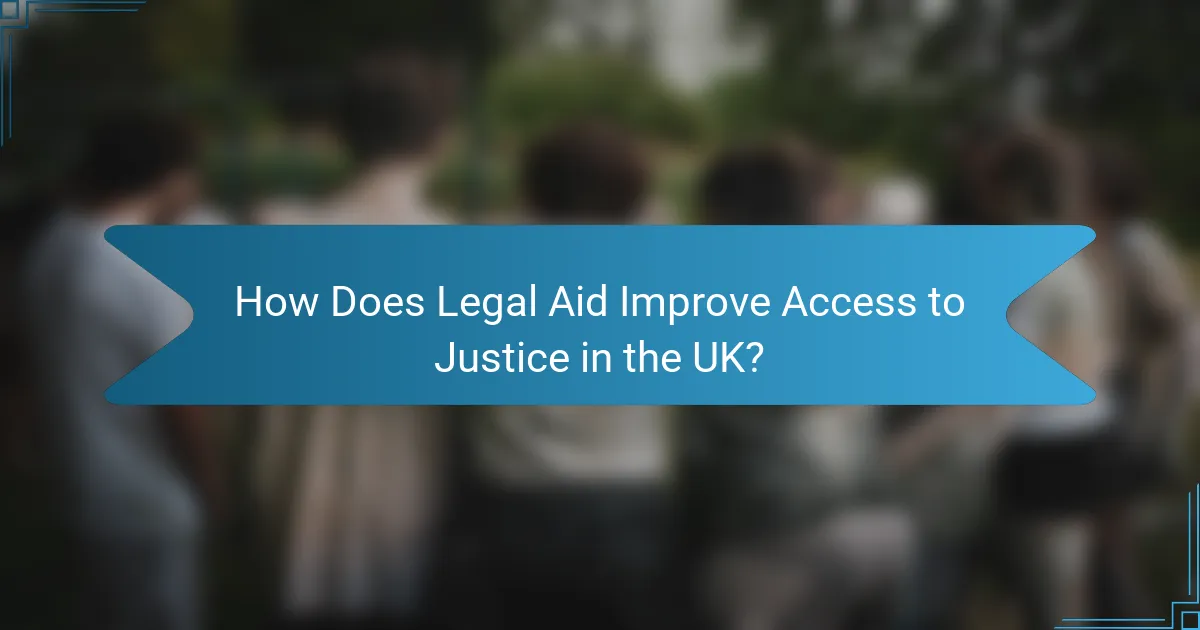
How Does Legal Aid Improve Access to Justice in the UK?
Legal aid enhances access to justice in the UK by providing essential support to individuals who cannot afford legal representation. This assistance ensures that everyone, regardless of financial status, can navigate the legal system effectively and assert their rights.
Reduces financial barriers
Legal aid significantly lowers the financial barriers that often prevent individuals from seeking legal help. By covering costs associated with legal advice and representation, it allows low-income individuals to pursue their cases without the burden of high fees.
For example, legal aid can cover court fees, solicitor charges, and other related expenses, which can otherwise amount to hundreds or thousands of pounds. This support is crucial for ensuring that justice is not reserved solely for those who can afford it.
Increases awareness of rights
Legal aid programs play a vital role in increasing awareness of individual rights among the public. By providing information and guidance, these programs help individuals understand their legal entitlements and the processes available to them.
Workshops, outreach programs, and informational resources funded by legal aid can educate communities about their rights in various areas, such as housing, employment, and family law. This knowledge empowers individuals to take action when their rights are violated.
Provides legal education and resources
Legal aid services offer valuable legal education and resources that help individuals navigate complex legal systems. These resources often include access to legal clinics, online materials, and one-on-one consultations with legal professionals.
By equipping individuals with the necessary tools and knowledge, legal aid fosters a more informed public that can effectively advocate for themselves. This proactive approach not only aids in individual cases but also contributes to a more equitable legal landscape overall.

What Are the Challenges Facing Legal Aid Services?
Legal aid services face several significant challenges that hinder their ability to provide effective support to individuals in need. These challenges include funding limitations, high demand for services, and the complexity of legal processes, all of which impact access to justice for vulnerable populations.
Funding limitations
Funding limitations are a primary obstacle for legal aid organizations. Many rely on government grants, donations, and private funding, which can be inconsistent and insufficient to meet the growing needs of their communities. As a result, legal aid services may have to turn away clients or limit the scope of their assistance.
In many countries, legal aid budgets are often constrained, leading to a reliance on volunteers and pro bono work. This can create disparities in the quality of services provided, as not all legal professionals have the same level of experience or expertise.
High demand for services
The demand for legal aid services is consistently high, often outpacing the available resources. Many individuals facing legal issues, such as eviction, domestic violence, or immigration matters, cannot afford private legal representation, which drives them to seek help from legal aid organizations.
This high demand can overwhelm legal aid providers, resulting in long wait times and limited availability of services. Organizations may need to prioritize cases based on urgency, leaving some individuals without timely assistance.
Complexity of legal processes
The complexity of legal processes can be a significant barrier for those seeking legal aid. Many individuals lack the legal knowledge required to navigate the system effectively, which can lead to misunderstandings and missed opportunities for resolution.
Legal aid organizations often need to provide extensive education and support to help clients understand their rights and options. This can be resource-intensive and may divert attention from direct legal representation, further straining limited resources.

What Criteria Should Human Rights Organizations Consider When Selecting Legal Aid Partners?
Human rights organizations should prioritize specific criteria when selecting legal aid partners to ensure effective collaboration and access to justice. Key factors include expertise in human rights law, reputation and track record, and the capacity to handle cases efficiently.
Expertise in human rights law
Choosing a legal aid partner with a strong background in human rights law is crucial. This expertise ensures that the partner understands the complexities of human rights issues and can navigate relevant legal frameworks effectively.
Look for organizations or attorneys who have specialized training and experience in human rights cases. They should be familiar with international human rights treaties and local laws that protect individual rights.
Reputation and track record
The reputation of a legal aid partner can significantly impact the success of a case. Assessing their track record with similar cases can provide insights into their effectiveness and reliability.
Consider seeking references or testimonials from previous clients and reviewing case outcomes. A partner with a proven history of successful interventions in human rights cases is more likely to deliver favorable results.
Capacity to handle cases
It’s essential to evaluate a legal aid partner’s capacity to manage the volume and complexity of cases. This includes assessing their resources, such as staff size, funding, and access to legal research tools.
Ensure that the partner can allocate sufficient time and attention to your organization’s needs. A partner with limited capacity may struggle to provide the necessary support, potentially jeopardizing case outcomes.
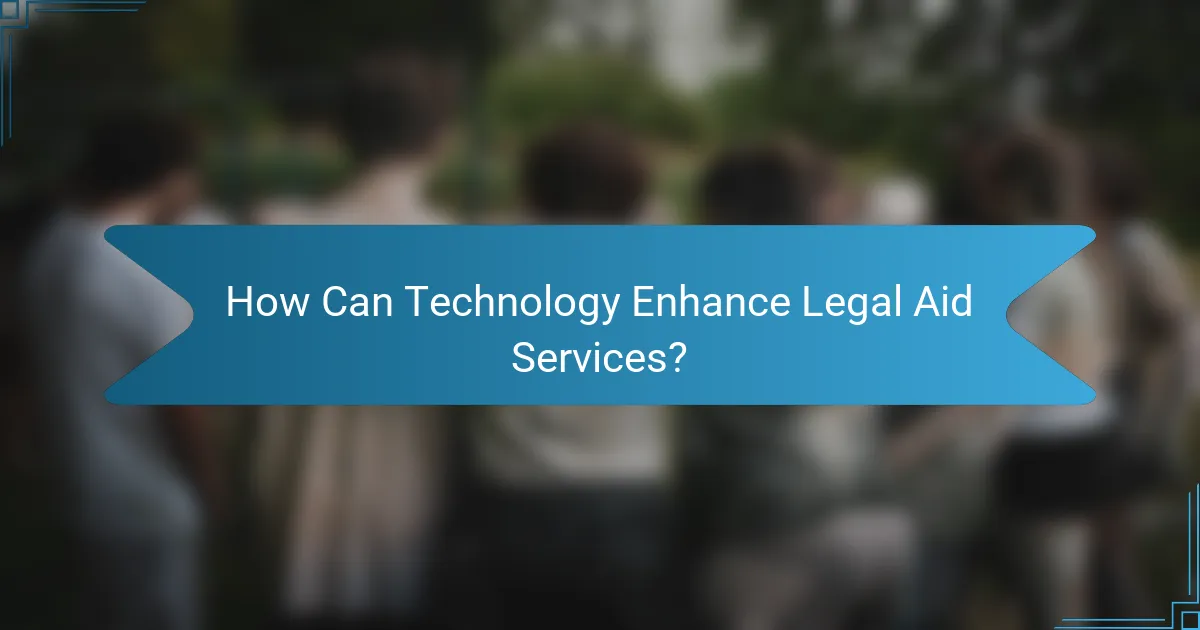
How Can Technology Enhance Legal Aid Services?
Technology can significantly improve legal aid services by increasing accessibility, streamlining processes, and enhancing communication. By leveraging digital tools, organizations can better serve clients and manage cases more efficiently.
Online legal resources
Online legal resources provide individuals with access to essential information about their rights and available legal services. Websites offering legal guides, templates, and FAQs can empower users to understand their situations and prepare for consultations.
Examples include platforms like LegalZoom or local government websites that provide information on legal procedures. These resources can help clients navigate common legal issues without immediate professional assistance, saving time and costs.
Case management software
Case management software allows legal aid organizations to organize and track cases effectively. These tools can streamline workflows, manage documentation, and facilitate communication between staff and clients.
Popular options include Clio and MyCase, which offer features like task management, billing, and secure client portals. Implementing such software can reduce administrative burdens and improve service delivery, allowing organizations to focus more on client needs.
Virtual consultations
Virtual consultations enable legal aid providers to meet clients remotely, increasing accessibility for those who may have transportation or mobility issues. This approach allows for flexible scheduling and can accommodate clients in various locations.
Using platforms like Zoom or Microsoft Teams, legal professionals can conduct meetings, share documents, and provide real-time assistance. It’s essential to ensure that these virtual environments are secure and compliant with privacy regulations to protect client information.
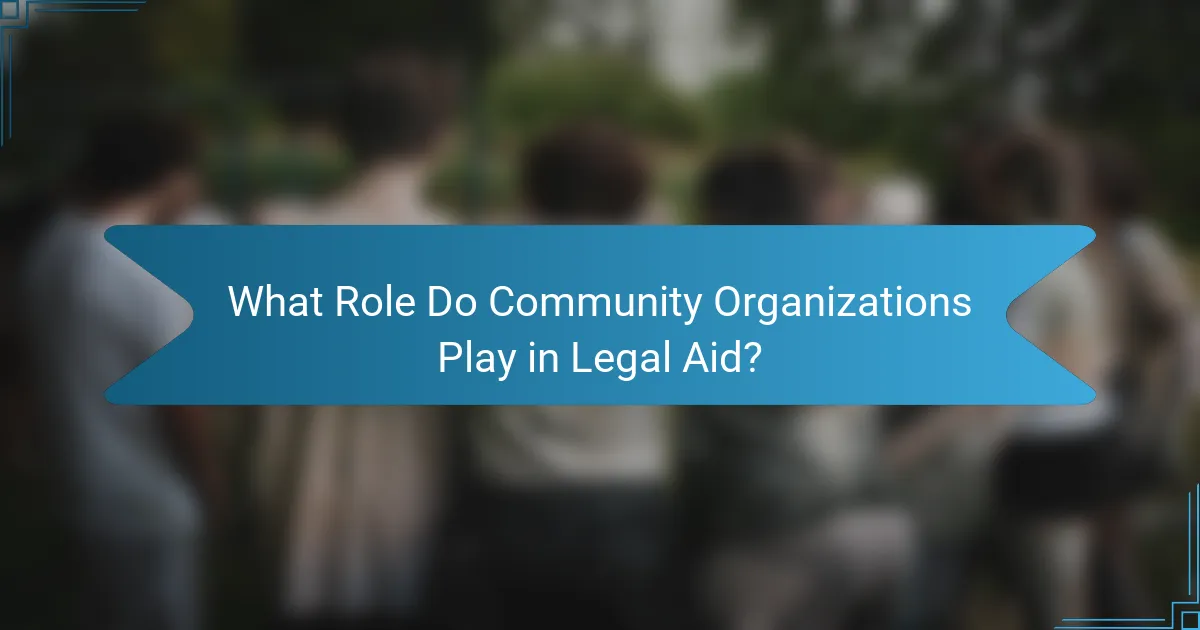
What Role Do Community Organizations Play in Legal Aid?
Community organizations play a crucial role in providing legal aid by bridging the gap between marginalized populations and the justice system. They offer essential resources, support, and advocacy to ensure that individuals can access legal services and understand their rights.
Access to Resources
Community organizations often serve as the first point of contact for individuals seeking legal assistance. They provide vital resources such as information on legal rights, referrals to legal professionals, and workshops on navigating the legal system. These resources empower individuals to take informed steps in their legal matters.
Advocacy and Support
In addition to providing resources, community organizations advocate for systemic changes that enhance access to justice. They work to raise awareness about legal issues affecting their communities and lobby for policies that improve legal aid funding and services. This advocacy is essential for creating a more equitable legal landscape.
Collaboration with Legal Professionals
Community organizations frequently collaborate with legal professionals to enhance their service offerings. By partnering with attorneys and law firms, they can provide pro bono legal services, ensuring that those who cannot afford representation still receive necessary legal support. This collaboration helps to alleviate the burden on public legal aid systems.
